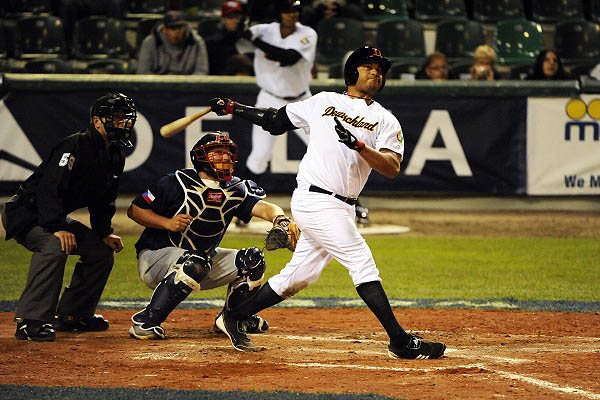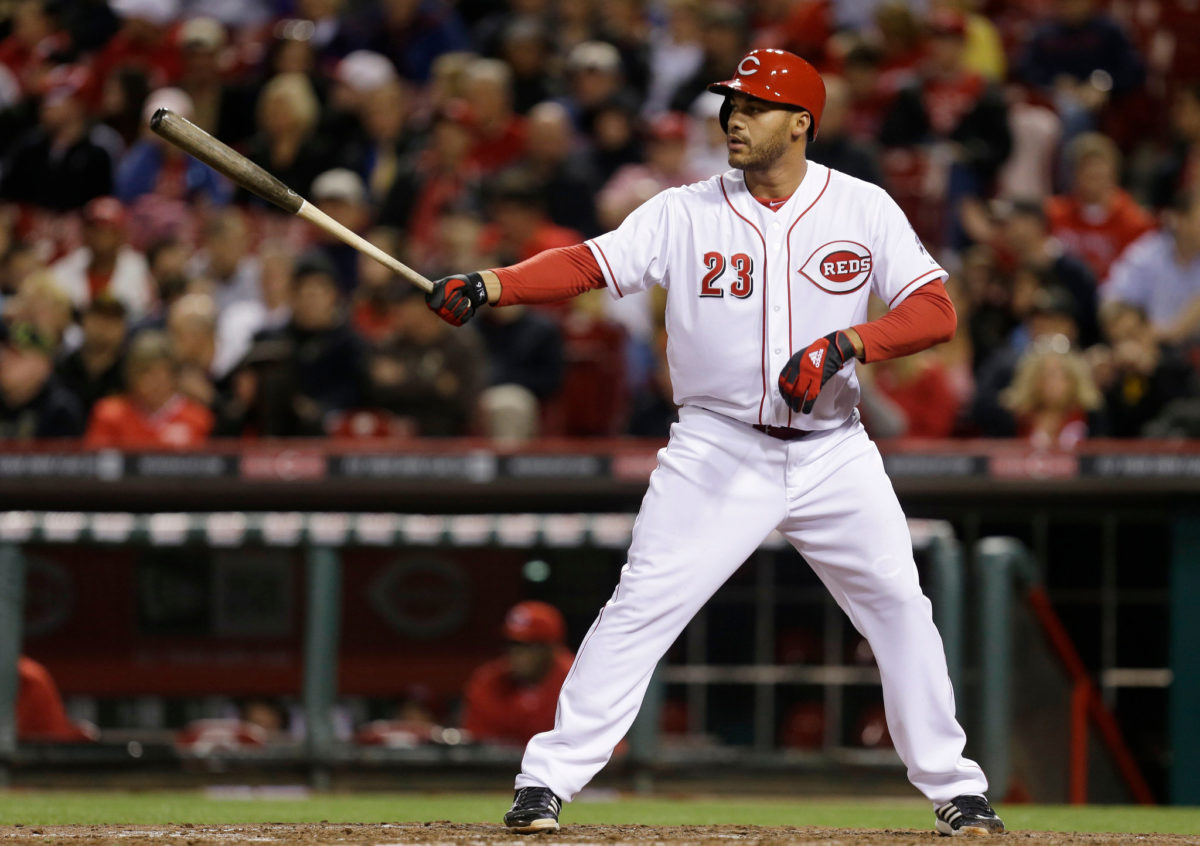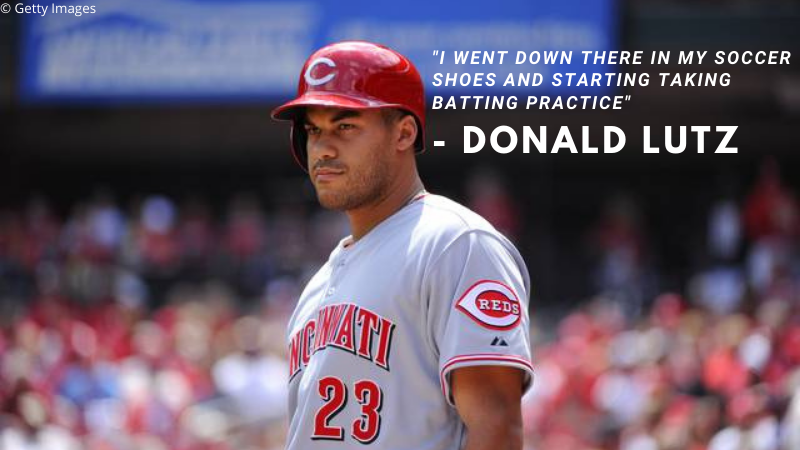November 10, 2020
By Carter Cromwell
When it came to baseball, Donald Lutz was a late bloomer but a fast learner.
His is the unlikely story of a guy who didn’t pick up a ball or bat until the advanced age of 14, but was playing professionally in the U.S. by 19 and in the major leagues at 24.
The son of an American father and German mother, he was born in upstate New York, but the family moved to Germany when he was just a few months old so he grew up near Frankfurt. For a long time, baseball wasn’t on his radar screen, though his older brother played and is still a member of the German national team.
“I got started in baseball late,” Lutz acknowledged. “I was playing hockey and then got into European handball, and I liked them both, but hockey got too expensive, so I needed to look for an alternative.”
It turned out that there was a military base in town and a baseball field just a couple of minutes away, and his brother got him to come down and check it out.
“I went down there in my soccer shoes and starting taking batting practice,” he said. “I was batting righthanded and not hitting anything and felt like the whole thing sucked. But then someone suggested I try batting lefthanded, and I suddenly started smashing every ball and fell in love with the game.”
And that took his life in a new direction – all the way to Cincinnati, not to mention Mexico and Australia.
“After that first time, they rushed me to get a player pass, but I barely knew the rules. I hit an inside-the-park home run my first at bat. On my second at-bat, I struck out swinging but the ball still hit me on the leg, and I thought I got to go to first base because I was hit by the pitch. I argued with the umpire for five minutes after he called me out,” he said with a laugh.
“At that point, I never imagined where baseball would take me,” he added. “I was just playing to be around friends and because I loved sports. Certainly, the thought of playing pro ball – especially playing in the major leagues – never crossed my mind.”
It would, though, in a relatively short time.

Lutz AB at the WBCQ with the German National Team. Photo credit: Gregor Eisenhuth
About a year and a half later, before he turned 16, he went to the baseball academy that had been established in Regensburg, Germany by the Regensburg Legionaere club. Martin Brunner, founder of the academy and now coordinator of European development for Major League Baseball, recruited him.
“I had noticed him,” Brunner said. “You look at things differently as a coach than as a scout. A scout looks at what abilities are there at the moment and any potential upside; a coach looks more at what he thinks is not there but could be developed. Even though his baseball skills were crude, I could see that he was a big kid [eventually 6-3, 230 pounds] with good natural strength.”
Considered one of the best, if not the best, baseball development programs in Europe, the Regensburg academy was then in its early years, but Lutz found it an extremely worthwhile experience.
“I wasn’t sure if I could do it, but my mother said I should at least go and try,” he said, “and it turned out great. I was there full time, along with seven or eight other guys. We would train and go to school during the week and play games on the weekends. School was as important as training; there was always someone there to help if you needed it.”
Brunner added, “Once he got to the academy, he worked very hard and became a big guy who could also move – that got the scouts’ attention.”
The next step came just a couple of years later in 2007. Lutz said he was one of 60 players from Europe and Africa invited to a three-week camp in Italy, at which a number of current and former major league players were to instruct.
Just before that, though, representatives of the Cincinnati Reds spent a couple of weeks at the Regensburg academy instructing and observing. He also did very well at a showcase event for European players in front of MLB scouts. Eventually, the Reds signed him to a free-agent minor-league contract.
“I’m glad Martin was there to help me navigate my way through the process because I was overwhelmed,” Lutz said. “It was so quick from the time I was playing hockey to when I was getting ready to go play pro ball in the States. At first, I didn’t even know there were different levels of the minor leagues.”
He started with extended spring training and then wound his way through three seasons (2008-2010) in the rookie leagues before starting to make a move.
“At first, the game was way too fast for me,” he acknowledged. “I’d never faced anyone throwing faster than 80 or 85. I punched out on, I think, in my first 18 at-bats. But I wasn’t intimidated, and I gradually started learning.”
He worked his way to Class A and then AA, along with winter-league stints in Australia and Mexico and a season in the Arizona Fall League. He was at Pensacola (Fla.) in the AA Southern League in 2013 when the call-up came in late April. Understandably, he remembers the experience in detail.
“I was in AA, but on the 40-man (Reds) roster,” he recalled. “We were in Tennessee and waiting out a rain delay. A bunch of the guys were trying to chase a bird out of the locker room, and the manager (former major league Delino DeShields) came out and asked what all the noise was about. Then he called me into his office, and I was worried that it might be bad news. Instead, he said ‘You’re going up’.
“At first, I didn’t realize what was happening, but then I started yelling, ‘I’m going to the big leagues’,” he continued. “I got a Gatorade shower and then had two hours to get to the airport and fly to St. Louis. I even had to stop at a mall on the way to buy a new suit.”

Lutz with the Reds. Photo credit: New York Times
He was so keyed up that he got virtually no sleep that night. The next day, April 29, before a large crowd, he debuted as a pinch-hitter in the seventh inning.
“[Manager] Dusty [Baker] said, ‘Lutz – grab a bat … you’re going in.’ I was so nervous that I forgot my batting helmet when I went to the on-deck circle,” he said with laugh. “When I went to the plate, the announcer said it was my major league debut, and the crowd gave me a big hand. Yadi [Molina] was catching, told me congratulations and then walked to the mound for a couple of minutes to give me a chance to drink it in.”
The first pitch from St. Louis mainstay Adam Wainwright was a 12-6 curve ball for strike one. The next pitch was similarly nasty, and Lutz shattered his bat on a groundout to second base.
His first hit came soon after against the Chicago Cubs – “It’s funny … the pitch before hit me on the foot, and I was mad because the umpire didn’t call it. But then I got a hit up the middle on the next pitch for my first RBI.”
Lutz batted .241 in 34 games that season and then .176 in 28 games in 2014 between minor-league stints in Pensacola and Louisville (Ky). In 2015, he hurt his elbow on a throw from the outfield and had to undergo Tommy John surgery. He was in the minors in 2016 and then released before the 2017 season. He played briefly in Mexico that summer and has played the last five winters for Brisbane in the Australian Baseball League. He was briefly with an independent league team and also in China for a couple of months before retiring – “I realized then that the pro ball dream was coming to an end.”

Lutz with the Brisbane Bandits of the Australian Baseball League. PC: The Chronicle (Aus)
In 2019, he was the hitting coach for the Reds’ team in the Arizona Rookie League. Later last year, he and his wife returned to Brisbane where they’re going through the immigration process while he’s doing some coaching and trying to start a youth baseball academy.
“We moved to Australia not for baseball reasons,” he said. “We’ve been here for several winters and thought it would be a great place to raise a family. Of course, the immigration process here is really tough, so we’ll see what happens.
I’m not sure where this journey is going to take me, but I’m confident that it’s going to work out.”
Not ready to hang them up? Seeking a new career path?
Annually our members sign over 300 contracts overseas. There are a variety of levels overseas which present opportunities for players and coaches, both aspiring and established professionals.




 Moonshot is a baseball apparel company based out of Mannheim, Germany, and is owned and operated by a good friend of ours, Juan Martin. What separates Moonshot from the other companies we have used in the past, is the value for your money and the customer service. You will not find prices like this in Europe or someone that responds faster.
Moonshot is a baseball apparel company based out of Mannheim, Germany, and is owned and operated by a good friend of ours, Juan Martin. What separates Moonshot from the other companies we have used in the past, is the value for your money and the customer service. You will not find prices like this in Europe or someone that responds faster. 
 High end, professional wood and composite bats with a wide selection of models using many different types of wood from Japan, North American and Taiwan. Hakusoh Bat is approved with the WBSC and across Europe.
High end, professional wood and composite bats with a wide selection of models using many different types of wood from Japan, North American and Taiwan. Hakusoh Bat is approved with the WBSC and across Europe. 




